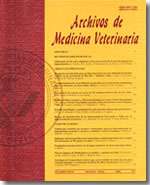Characterisation of Staphylococcus aureus isolated from cases of bovine subclinical mastitis in two Uruguayan dairy farms
Main Article Content
Abstract
The aim of this work was to identify and to characterise Staphylococcus aureus isolates associated with subclinical mastitis obtained from milk of lactating cows showing a California Mastitis Test (CMT) score result of traces, 1, 2, or 3. Coagulase, hemolysis, presence of capsule, slime formation, biofilm production, autoaggregation, hemagglutination and antibiotic susceptibility were assessed to evaluate S. aureus virulence factors expression potentially associated to bovine subclinical mastitis isolates. Prevalence of subclinical mastitis along the study was low and did not correlate with months or climatic variables. Most of S. aureus (20) were isolated from milk samples showing a CMT score result of 1. Formation of capsule, slime, biofilms and the occurrence of bacteria aggregation in all the tested isolates converged in the bacterial ability of adherence and persistence in the mammary gland and probably contribute to the further chronicity of the infection and even the colonization of dairy installations. Resistance against a set of commonly used antibiotics was low. The evaluation of virulence factors of S. aureusisolates in the context of subclinical mastitis in dairy farms may be useful to develop precise actions and treatments to control mastitis and to improve animal health and milk production in dairy bovine herds.

